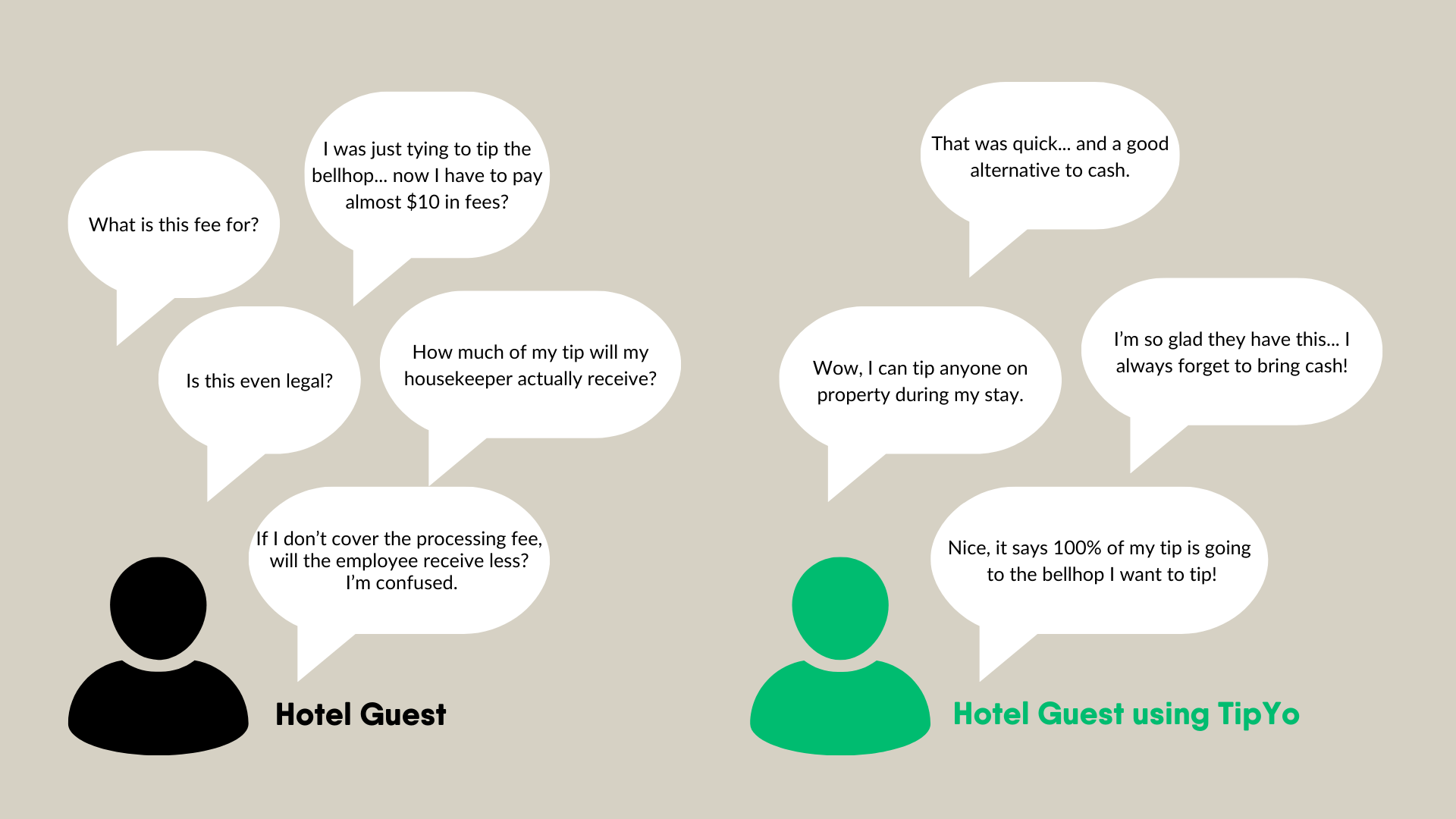What’s the hottest emerging technology to hit the hotel space? It’s fair to say digital tipping!
Digital Tipping is the ability for a hotel guest to use their mobile device to tip a NON-point- of-sale employee.
Why should hotel brands, management companies, franchises and operators care about digital tipping?
- Hotel guests demand a cashless experience and yes, guests do like to tip!
- Non-point-of-sale employees take-home pay is being greatly impacted due to guests not carrying cash.
- Simply put, this is a human resource issue, and the hotel/brand can gain a lot from implementing a digital tipping platform.
Two years ago, the hotel market saw a handful of digital tipping trailblazers offering their services to interested hotels. Today, one iconic brand leader recently shared “the market is saturated with digital tipping provider options.” And, with saturation, well, comes confusion.
It takes time for regulatory bodies to catch up with emerging technology such as Digital Tipping. In the interim, vendors are left to navigate the emerging space on their own, including deciding who should pay for digital tipping and how much it should cost.
TipYo has always advocated that digital tipping is a human resource benefit for hotel employees and therefore the hotel operator should pay for it. Hotels have a lot to gain from implementing a program that ultimately increases employees’ take-home pay and job satisfaction. Fee structures should be predictable and not based on the amount a guest tips, which naturally disincentivizes large tips.
How Some Digital Tipping Fee Structures Harm Brand Reputation
Mandatory Fee to Guest: Many providers are using a fee model that charges the guest an “administrative” or “service” fee. This fee is often the credit card processing fees plus an additional percentage to pay the digital tipping vendor.
While it may save hotel operators a buck, charging guests these fees to tip employees affects guest perception of digital tipping AND of the hotel property or brand.
With fees ranging from 3% to 21% (yes, 21%!!) at what point is the educated guest going to say, “wait a minute, enough already!”
Additionally, these providers are in violation of VISA’s published consumer protection regulations. Many digital tipping enablers have been notified that they are violating card not present rules and have been fined. If your hotel is participating in this fee structure, it’s recommended to switch tipping providers to one that doesn’t violate consumer protection regulations.
Optional Fee to Guest: As some digital tipping providers are becoming aware of VISA regulations, they have tweaked their offering to make the fee “optional”, thus avoiding the regulatory consequences. Instead of forcing the guest to pay the fee, the provider will put in place a system that presents the guest with the option to cover the fee, or let it be taken out of the employee’s tip. While this language may be customary in other markets like the charitable space, brands need to consider the optics and potential legality of this option. Asking the employees to pay for the processing of their own tip is against labor laws in some states.
Protect Brand Reputation, Build Guest & Employee Trust, & Success with the Right Provider
In a time when guests are experiencing tipping fatigue, it’s important to show guests they can trust the digital tipping platform by being transparent about where the money is going. TipYo proudly displays “100% of the tip goes to staff” at the top every time a guest chooses to use our platform to digitally tip so there’s no guest confusion as to what the employee is actually receiving.
Best practices for employees and guests should be transparent. TipYo’s workflow includes the tips (which are wages as defined by the IRS!) through payroll. Hotel management should let the employees know they can expect 100% of the tip to go to them with the appropriate state and federal taxes withheld through regular payroll processing. Employees should never pay processing fees or be required to self-report their taxes.
Lastly, Hotels and Brands alike should think twice before implementing a strategy that by avoiding payroll altogether and using a direct-to-employee disbursement platform is the easiest way. It is of utmost importance that the employees know that they will have to pay taxes on these tips. Additionally, the hotel has the same legal reporting requirement that cannot be overlooked. TipYo advocates that hotels disburse through payroll, which is done easily using the TipYo Platform and can account for taxes and reporting requirements through that process.
The Proof is in the Pudding.
The proof is in the pudding: the TipYo tip average is an industry high, and guests often leave large tips of $50, $100, and $150. Because our partners pay a nominal flat subscription fee, guests are not deterred by exorbitant and surprising fees to express their appreciation to an employee.
Digital Tipping, as a critically important emerging technology, is facing a watershed moment. Adopting best practices early on will determine whether a digital tipping platform succeeds or falls short of its potential.

